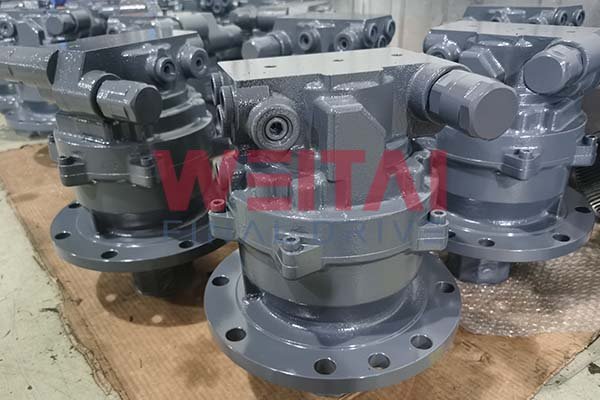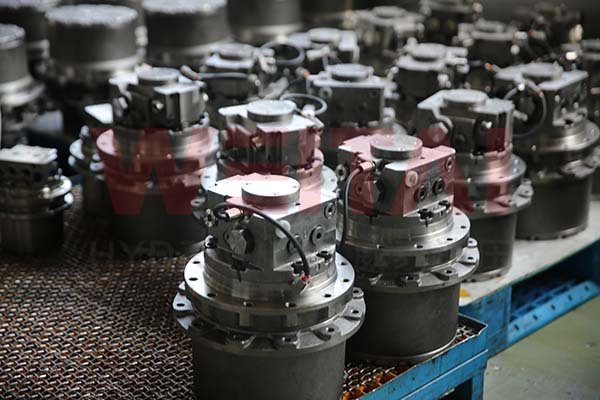Hydraulic travel motors are essential components in heavy machinery such as excavators, dozers, and track loaders, providing the power and mobility that make these machines effective in tough work environments. Choosing the right hydraulic travel motor for your equipment is crucial for ensuring optimal performance, efficiency, and longevity. With various motor types, specifications, and features available, selecting the right one can be a complex decision. In this blog post, we’ll explore the key factors to consider when choosing the best hydraulic travel motor for your equipment.

1. Understand Your Equipment’s Requirements
Before diving into the technical details of travel motors, it’s essential to assess your equipment’s needs. Each machine has specific performance requirements based on its application, size, and workload.
Key considerations:
- Type of equipment: Excavators, loaders, and cranes all have different power and speed requirements, so the travel motor must be suited to the specific machine.
- Work environment: Consider whether the equipment will operate in tough terrains such as rocky surfaces or soft soils. Motors designed for rugged environments may need reinforced components and high torque output.
- Load capacity: The motor should handle the weight and force required to move the equipment efficiently, especially when loaded.
By matching the motor’s specifications to the machine’s application, you’ll ensure your travel motor can handle the required tasks efficiently.
2. Evaluate Hydraulic Travel Motor Torque and Speed
One of the most critical performance factors in a hydraulic travel motor is its torque and speed. These two parameters determine how much power the motor can deliver and how fast the machine can travel.
Key considerations:
- Torque: Machines operating on steep inclines or rough terrain require high torque to maintain movement. Higher torque motors also provide better control when lifting or carrying heavy loads.
- Speed: Depending on the type of work, you may need a motor with higher speed capabilities. For example, machines covering large areas (e.g., trenchers or long-distance loaders) benefit from faster travel speeds.
Choose a travel motor with a balance of torque and speed that suits your specific operational needs. For machines requiring precise, controlled movements, prioritize torque over speed.
3. Consider the Motor’s Efficiency
Hydraulic travel motors are integral to fuel efficiency and overall energy use in your equipment. A more efficient hydraulic travel motor will reduce energy consumption and lower operating costs, especially in machines that run for extended periods.
Key considerations:
- Energy efficiency: Opt for motors that are designed with energy-saving features, such as optimized hydraulic circuits and reduced internal friction. This will lead to lower fuel consumption.
- Heat management: High-efficiency motors often have better heat management, preventing overheating during continuous use and extending the life of the motor.
By choosing an efficient hydraulic travel motor, you can save on fuel costs and reduce the environmental impact of your operations.
4. Match The Hydraulic Travel Motor Displacement to Your Needs
Motor displacement refers to the volume of hydraulic fluid that passes through the motor during operation, influencing the motor’s torque and speed. There are two types of displacement motors: fixed and variable displacement.
Key considerations:
- Fixed displacement: These motors deliver consistent torque and speed, making them ideal for machines that perform repetitive tasks under consistent conditions, such as compact loaders.
- Variable displacement: These motors allow for greater flexibility, adjusting torque and speed according to the operating conditions. They are particularly useful in equipment like excavators, which require varying performance depending on the task.
If your equipment needs to perform under varying conditions, a variable displacement motor will offer better adaptability and control.
5. Assess Durability and Reliability of the Hydraulic Travel Motor
Hydraulic travel motors operate in demanding environments, often exposed to dirt, dust, water, and heavy loads. Durability and reliability are essential for minimizing downtime and avoiding costly repairs.
Key considerations:
- Quality of materials: Choose motors made from high-quality materials such as hardened steel or reinforced components to ensure they withstand tough conditions.
- Sealing and protection: Opt for motors with superior sealing systems to protect against contamination, debris, and moisture, which can cause internal damage.
- Maintenance requirements: Look for motors with lower maintenance demands, such as self-lubricating bearings or easily replaceable parts, to reduce service intervals.
A durable and reliable motor will extend the lifespan of your equipment and minimize operational interruptions.
6. Check for Compatibility with Your Equipment
Ensuring the hydraulic travel motor is compatible with your machine’s hydraulic system is critical for seamless integration and optimal performance.
Key considerations:
- Hydraulic system pressure: Match the motor to the pressure output of your hydraulic system. A mismatch can lead to performance issues or even damage the motor and system.
- Mounting configuration: Ensure the motor’s mounting dimensions and connections align with your machine’s specifications.
- Flow rate: The motor should be compatible with your machine’s hydraulic flow rate to ensure smooth operation.
Compatibility is key to avoiding mechanical issues and ensuring that the motor performs effectively under load.
7. Consider After-Sales Support and Availability of Parts
Once you’ve selected the right travel motor, after-sales support is essential for ensuring long-term reliability and performance.
Key considerations:
- Parts availability: Choose a manufacturer or supplier that provides readily available spare parts. This will reduce downtime if repairs or replacements are needed.
- Warranty and support: Opt for a travel motor that comes with a robust warranty and good customer support. This can save you costs in the long run if any issues arise.
Having strong after-sales support will ensure smooth operation and quick resolution of any potential problems.
Conclusion
Choosing the best hydraulic travel motor for your equipment requires careful consideration of factors like torque, speed, efficiency, durability, and compatibility. By understanding your machine’s specific needs and working conditions, you can select a motor that not only enhances performance but also provides long-term reliability. Investing time in selecting the right motor will result in improved productivity, reduced downtime, and better operational efficiency.
Whether you’re upgrading or replacing a travel motor, these tips will help you make an informed decision, ensuring your equipment stays powerful and mobile in all conditions.



